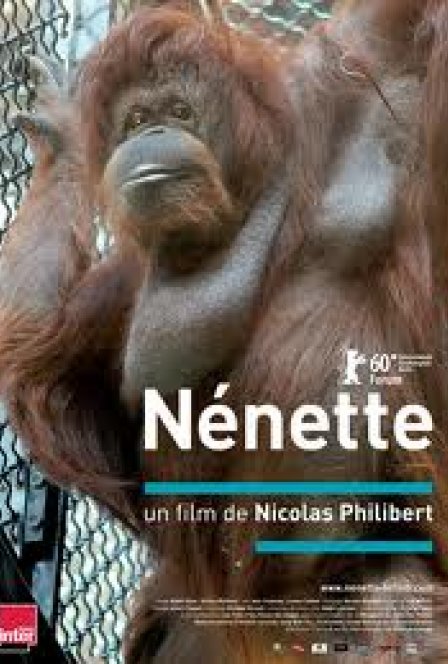A sweet, if slight, documentary, Nénette turns its gaze on the orangutans of the Paris Jardin Des Plantes zoo. In fact, that is all we see — mirroring the spectators who visit the zoo, the fixed camera observes the captive apes as they live their quiet lives behind the thick glass. Of particular interest is the film’s namesake, Nénette, the matriarch who has spent most of her 40 years in the zoo. We hear various visitors and zookeepers share anecdotes and muse about the potential thoughts of Nénette and her clan, though the animal who hides behind doleful eyes and a mop of red hair remains a mystery.
Nénette was born in Borneo in 1969 and came to the Paris zoo in 1972, where she has remained ever since. We learn that in her lifetime, she has had four children and three mates. According to her zookeepers, she can be tricky to get close to, requiring years of warming up in order to form a true bond with her caretakers. Judging by her doleful expression, she is prone to fits of melancholy. Her pleasures are simple: spending time with her son Tubo and enjoying her afternoon tea and yogurt. She has relaxed into the autumn rhythms of her later years.
The film has a simple structure, built around a composed, still frame that simply watches the orangutans at play and at rest, much as if we were at the zoo observing them ourselves. The audio track picks up the comments of various visitors to the zoo, young and old, as they marvel and laugh at the apes, trying to guess their thoughts, reading human emotions and traits on their faces. However, this narrative conceit wears a bit thin, and I question director Nicolas Philibert’s choice to expand this intended short into a feature. I found my attention dropping in and out of this film’s meditative 67 minutes.
What pulled me back in was the commentary by Nénette’s zookeepers over the years, who share insight into her character built on actual observation of her behavior, not just wishful thinking. And indeed, the film is more interested in exploring the examined life of the captive, with a simple narrative that moves from more scientific texts on orangutans to philosophical thoughts on the existential nature of a life of captivity. Appropriately, it closes with the more acute and pained thoughts of a bystander who ponders the psychological effect of Nénette’s enclosed life.

